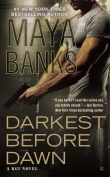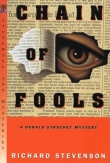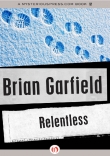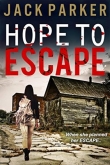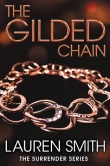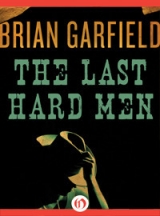
Текст книги "The Last Hard Men"
Автор книги: Brian Garfield
сообщить о нарушении
Текущая страница: 7 (всего у книги 12 страниц)
“Zach ain’t here,” Portugee murmured, and got to his feet. “You ain’t fixin’ to spoil the fun, are you?”
“Aeah,” Shelby sighed, “I guess I am, Portugee.” He eased himself upright and planted his boots a couple of feet apart.
Portugee laughed softly. “Let’s bust him, Will.”
The girl was getting up too. Her breasts moved when she turned. She pinched her lower lip with her teeth and she gave Shelby a frightened frown.
Gant said, “Only aimin’ to do her a kandness, Mike. She gonna enjoy it, you know she will.”
Shelby drew out his gun and spoke from a semi-crouch: “Forget it. I like you all right, Will, but we don’t need you. I don’t want to have to shovel dirt in your fat face.
Portugee rose up on his dignity. “Ain’t no call for you to pull iron on us, Mike.”
“Just back off, then, and I’ll put it away. I’ve got no fight with you two.”
Portugee and, Gant looked at each other. They were wavering, and Shelby helped them along: “You know damn well both of you together couldn’t pour piss out of a hat if the instructions were written on the brim. Fooling with me can only buy you wooden suits—either from me or from Zach when he gets back. Come on now, be sensible. Go on over in the woods and jack your rocks off if you need to, but leave her be.”
Gant took his hand out of his pants. Color suffused his face. Absurdly, he said. “That ain’t no way to talk in front of a lady.”
It made Menendez, over in the shade, laugh until he almost ruptured himself.
Provo came into the trees on his horse. His crag of a face was stern, the dark eyes had a hard glitter. “Assholes,” he said, voice grating in his windpipe. “You fools have got a fucking gift for trouble. Leave you alone five minutes and you find some stupid way to bring us grief. I told you two bastards to keep your pants buttoned. And you, Mike, you made a mistake pulling that gun—but once you pulled it yon should’ve used it. Don’t pull iron on a man unless you’re fixing to shoot him.”
Portugee said uncomfortably, “Shit, you don’t miss much, do you?”
Shelby, stiff and stung by the rebuke, said defensively, “I’d have used it if they’d forced it. Hell, I didn’t need to.”
“Then you shouldn’t have pulled it.”
“Jesus, Zach, even Menendez thought it was all a big laugh.”
“Balls. We can’t afford a killing here, the Navajos won’t put up with it Menendez was right to head it off. He used his head. Maybe you’ll learn to use yours if you live long enough. Now everybody gather round here.”
The others drifted in. Shelby went to take Susan Burgade’s elbow but she jerked galvanically when he touched her. He stayed with her and listened to Provo from where he stood.
“Were all set. They’ll side with us as long as we treat them friendly. Everybody remember that. Anybody lays one finger on a Navajo and I’ll personally cut that finger off.”
Will Gant said, “How’d you do it, Zach?”
“Reminded them it’s white men after us and white men’s money we stole. I told them it’s Burgade back there. Everybody up here knows it was Burgade killed my wife. She was a fullblood Navajo and she was innocent as the day she was born; she didn’t have a thing to do with Burgade’s fight with me and. the people know it. So Sam Burgade ain’t about to get any favors from these people.
“That posse’s bound to pull in here soon,” he continued. “The Navajo police will keep them busy a few hours and then they’ll turn the posse back to the Reservation line—white man’s law can’t set foot on this Reservation. Burgade figures to come on after us, and he’s good enough to slip through past the Agency police, unless he’s got awful dumb or awful unlucky in his old age, but he’s just one man. I aim to set him up where I want him and kill the old bastard one bullet at a time.”
Susan’s eyes were almost closed. She swayed on her feet. Shelby reached out to prop her up but she shoved herself away from him. Her rigid back expressed rage and terror all at once. Shelby felt vaguely uncomfortable. He didn’t care what happened to Sam Burgade—everybody’s father had to die sometime. But it made him uneasy to see what it was doing to Susan. Listening to Provo talk about his dead wife made him pretty sure Provo had something just as ugly in mind for Burgade’s daughter.
Will Gant, who was shrewder than he looked, said, “Hepping us can get these Innuns in trouble with the Innun Bureau. You must of done a heap of persuading.”
Offhandedly Provo said, “Sure. But I told them where they could go dig up ten thousand dollars in gold to help folks out on the Reservation. Up here ten thousand dollars is more than the whole tribe sees in a year. They’ll side with us long enough to suit me. By the time the Bureau starts leaning on them we’ll be long gone.”
“Ten thousand,” Shelby said. “You said you had forty-eight thousand buried.”
“You don’t think I was stupid enough to cache it all in one place, do you? It’s scattered in four hideouts. One cache, maybe somebody could stumble across it by accident. But not four of them.”
“Smart,” Shelby said, and filed it: one more good lesson to memorize.
Will Gant was looking at Susan with a strange light in his eyes. “What we aiming to do about her, Zach?”
Provo smiled a little, not with his eyes. He quoted softly, “Patient, ever patient, and joy shall be thy share. Bear that in mind and you’ll be all right, Will. Just don’t crowd things.” He looked at the girl and his gentle laughter had the cruel dry sound of dead leaves rattling in an autumn wind.
Don’t get too het up about her problems, Shelby told himself. You got enough of your own.
Provo said, “Taco, Quesada, saddle ’em up.”
The two of them turned and went. George Weed went with them.
Portugee said, “Where we going now?”
“Down the Little Colorado,” Provo said. “Redrock country. I’ve got a place in mind up between Cedar Ridge and Marble Canyon.”
“That where you got the rest of that gold hid?”
“That’d be telling,” Provo said. He smiled with his mouth again. “But I ain’t got a double-cross in mind. I saw you thinking about what happened to Lee Roy, but Lee Roy was no good, you could see that. He’d have found some way to get us all killed. You’ll get your share of the gold, Portugee.”
“That’s right,” Portugee said. “I will. But what then?”
“Then you can go wherever you want. Personally I’d recommend northeast. Nobody’s going to track up through the Rockies. Straight on up through Colorado and Wyoming and Montana. Right into Canada and maybe ship out for Vancouver. But that’s up to you-all.”
“What about you?” Shelby said.
“Me?” Provo laughed unpleasantly. “All I want is Sam Burgade.”

Eight

The Navajo policemen subjected the posse to the long-winded rigmarole of formal protocol. After an hour of argument during which nobody budged and everybody remained excessively polite, Sam Burgade uttered a curse and stamped outside the Agency police shack. A blowsy woman gave him a flat stare of evident dislike and made a point of absenting herself from his vicinity. A stray vesper brought to his nostrils a malodorous outhouse smell.
Nye came outside and said, “We ain’t about to change their mands, Captain.”
“I know. Provo got to them.”
“What you reckon he give them?”
“A lot of sweet talk and some of that Santa Fe gold he’s got buried up here.”
“I’d admire to bust rat through here and keep after them, but I don’t reckon that’d set well with the federal gov’ment. They don’t cotton to anybody pushin’ onto the Reservation without the Navajos allow it. All them bleedin’ hawts back East git all up in arms about white folks bustin’ treaties. My deppities and me could maybe get in dutch, but rat now I don’t reckon that’s my main worry. Main thing is, Captain, I’m a sworn officer of the law. If I go on after Provo now I’m bustin’ the law. I’m out of my bailiwick on Navajo land, I got no authority here at all.”
“I know that, Noel.”
“Gravels hell out of me to let you down, Captain.”
“You’ve got your duty.”
“Yes, sir, I do. But I sure don’t lak it much.” Nye’s eyes flickered when they touched his. “Captain, we got to turn back.”
“I won’t argue with you.”
“You got to come back with us.”
Burgade’s silence argued with him.
“Captain, you got no authority here neither. You got no right on Innun land.”
“I guess that’s between me and the Indians, isn’t it,” Burgade said. “I’ll take my chances.”
“You ain’t got no chances, Captain.” Nye’s voice had gone harsh, angry more with himself than with Burgade. “They’s seven men out there alongside of Provo. Eight men you got to fight alone. You cain’t do that, no way. And don’t you know it’s exactly what Provo wants you to do?”
“Yes, I know that.”
“Then quit pretending lak you just too damn proud to quit. You ain’t a stupid man.”
A knotted muscle rippled in Burgade’s cheek. “Provo needs me the way the ax needs the turkey. If I don’t keep after him he’ll have no more use for Susan—he’ll set his dogs on her.”
“You better stop and study on that awhile. You fixing to make a powerful mistake. Those eight convicts put you under a gun, I don’t know but one way it can come out. You got to die. You dying ain’t going to hep Susan none.”
“Everybody’s got to die,” Burgade breathed, “but nobody’s got to give up.”
“Shit, Captain, that’s a fine sentiment but it don’t cut no ice with me. You got sixteen million acres of Navajo Reservation out yonder. No shade except maybe your own shadow. You fixing to go out into that and bust your lance against them eight men awmed to the teeth. And up against all that, the only thang you got left is knowing you ain’t going to give up? Shit. Zach Provo’ll trample you under and never even look back to see what-all he stepped on.”
Burgade’s toes curled inside his boots. His face was a bitter mask.
Nye looked straight ahead, not at him. “Captain, if I got to say it all, I will. You don’t even ride good no more. You just too cocksucking old to fight.”
In the blinding sunshine every shadow was black and had a sharp edge. The heat sucked sweat from Burgade’s pores. Hal Brickman came out of the police shack and stood under the porch shade within earshot.
Burgade said, “I haven’t got a lot of time to argue with you, Noel. But maybe you’ll understand this. If I turn back now, knowing what they’ll do to Susan, I don’t think I’d last a week without putting a gun in my mouth and pulling the trigger.”
“I know how you feel about that, Captain, but you forgetting one or two thangs. It ain’t going to take but five, six days, maybe a week, before we get enough pressure against the Navajo Council from Washington on down to allow us to bring posses onto the Reservation.”
“By that time Susan will be dead and the gang will be a thousand miles from here. Hell, Noel, getting off this Reservation’s no harder than getting onto it. There’s no fence. They’re free to sneak out of here anywhere along a thousand miles of boundary and we won’t have any idea where to look.”
“Could be. But forget Zach Provo, Captain. I’m only thanking about your daughter. Look, Provo don’t want to kill Susan, he’s only using her for bait. Shit, if he kills her he’s obliged to get every awmed man in the United States after his hide. He knows what’s got to happen to him if he kills her. Even them Agency police will be on his ass. He won’t have no place left to hide out. He cain’t afford that. No, Captain. He fands out you ain’t on his track, and he’ll turn Susan loose. It’s the only thang he can do.”
Hal Brickman stepped out of the shade and came forward, “Maybe the sheriffs right about that, you know. Provo’s smart enough to know what’ll happen to him if Susan comes to any harm.”
“If you knew Provo better you wouldn’t think that way.”
Nye said, “Provo’s a lot of thangs but he ain’t stupid.”
“If he cared about his own skin,” Burgade said, “he wouldn’t have kidnaped Susan in the first place. He had plenty of chances to get clean away, out of the country. He didn’t. He came after me instead. Listen—he’s lived the past twenty-eight years for one thing. Revenge. He doesn’t care whether he lives or dies, so long as he takes me with him and makes me suffer along the way. If I turn back now, he’ll only have one way left to make me suffer.”
Hal Brickman’s eyes widened. “You mean kill Susan.”
“That’s it. If I don’t show up where Provo can see me in the next twenty-four hours, she’ll be dead, and he’ll see to it I find out about it.”
Nye’s voice began to climb unreasonably. “But god-damnit, Captain. S’posin’ you do show up? S’posin’ you take his bait? What good’ll that do Susan?”
“Maybe he’ll make a trade,” Burgade murmured.
Nye stared at him. “You for Susan, you mean.”
“He might do it.”
“Jesus goddamn Christ.”
The deputies came out of the shack, followed by two uniformed Navajo police who stood on the porch and folded their arms and watched while the posse got mounted. Burgade said, “I’ll have to ride back with you until we’re out of sight.”
Little gray birds flitted soundlessly from the roof of the police shack to the treetops up by the spring. Burgade locked both hands around the saddle horn and hauled himself up by an effort of will. Riding away from the village, Nye said to him, “Jesus, Captain, you ain’t in no fit shape.”
“Shut up.”
They batted south along the tawny earth, everybody in a bitter frame of mind. It took forty-five minutes to get beyond the line of sight of the Castle Butte village. Nye said, “Maybe you ought to ride back at least as far as the line. You know damn well they gonna come out here in a little while to see if we kep our word.”
“I can’t waste that much time, Noel.”
The posse came to a ragged halt. Nye’s unrevealing eyes swept bleakly across them. “Moorhead, you mand swappin’ horses with the Captain? I believe you got the best horse of the bunch there.”
“I’ll keep this one” Burgade didn’t want to have to dismount and climb up again. He said, “But I’d take it kindly if some of you’d let me have a little spare food and a couple of canteens.”
“You heard the Captain. Pony up, boys.”
Hal Brickman kneed his horse forward. “I could use some provisions too, Sheriff.”
Burgade said, “Forget it, Hal.”
“No. I’m going with you.”
“I appreciate the gesture, Hal, but—”
“If I turn back now and anything happens to Susan, I’ll feel exactly the same way you’d feel. You’ve got to see that.”
A gust of wind came along, like a breath from an oven. The hovering glare had given Burgade a headache. He studied Hal over a long stretch of time and finally he said, “You stand an excellent chance of being killed if you ride with me. You accept that?”
“Yes, sir. I know I’m a greenhorn but I can shoot. I’ll do what you tell me to do.”
Nye said, “God knows you could use the hep, Captain.”
“All right, Hal. It’s your decision.”
“Thank you, sir.”
“Don’t thank me, for God’s sake.”
They looked back a couple of times and saw the posse’s dust receding to the south. Burgade chose a westerly course that kept them below the horizon, running along dry watercourses and the groined notches between low hills. “We’ll circle around and try to pick up their tracks north of Castle Butte.” The strong sun slashed at them, hot breezes raked them with sinister abrasive caresses, there wasn’t a vestige of shade anywhere; sweat was sticky in the small of his back, in his palms, in his crotch, on his lips and throat. He had got inured to the smell of himself.
An eagle passed high overhead with a steady wingbeat. The empty land was a match for Burgade’s emptiness of spirit. Sixteen million acres, Nye had said, and that was just about exactly the size of it. The Reservation sprawled all over the high desert, overlapping the boundaries of four states. Most of it was just like this—a leafless sun-blasted furnace, broken here and there by craggy mesas and cutbank arroyos and the deep-canyon tributaries of the Colorado: the Grand Canyon was just a little way to the northwest.
It was a hard-mouthed horse, a small tough gray gelding. Burgade set a pace to conserve the animals—walk, trot, canter, then walk again. The gray fought the bit at every turning.
Hal didn’t speak unless spoken to. It was a silent ride for the first hour, and then, partly to keep himself awake, Burgade began to talk. “Can you use that gun?”
“I said I could, sir.”
“I know what you said.”
“I’m a good target-shooter. I’ve never shot at a man.”
“Think it over, then. If the toughs see you with a gun in your hand they’ll assume you know how to handle it. It’ll only encourage them to use theirs first.”
“Yes, sir. But I don’t imagine they’ll need much encouraging from me.”
“Yes, I expect that’s so,” Burgade said. “Look, they’re on the run from the hangman. They killed two prison guards and left a man dead at the smelter. That makes them all equally guilty of first-degree murder in the eyes of the law. Now, even leaving Susan aside, you know what that means.”
“Yes, sir. I have a pretty good idea what they’ll do to anybody who gets in their way.”
“Keep your head down, then, and don’t smile at any strange faces. These men are quick and they’re short-fused.”
About four in the afternoon they found tracks. Burgade didn’t dismount for a close-up look. Hal said, “How do we know these are the right tracks?”
“Not likely to be more than one party this big out here today.”
“Maybe they’re older—maybe they’re from a week ago. How can you tell?”
“By the amount of dust the wind’s blown into the prints. These are only a few hours old. Look there at the horse droppings.”
There was a line of muffin-droppings, undoubtedly still soft and warm: they were still green.
The tracks went straight into the northwest. They kept moving into the waning afternoon. To keep from falling asleep Burgade told Hal everything he could remember about Provo and those of Provo’s men he had known. Hal seemed to take it all in—Portugee Shiraz’s fondness for knives, George Weed’s extraordinary skill with guns, Provo’s weakness for unnecessary complexities in trying to outguess his opponents. It was the bewildering intricacy of Provo’s scheme that had tripped him up twenty-eight years ago. “He’d have got away clean if he hadn’t tried to be quite so tricky. He may be making the same mistake this time.”
“What was his mistake?”
“He didn’t run for it when he should have. He decided to bluff it out.”
“I never did hear about that. How it really happened, I mean.”
“The Santa Fe trains used to stop for water west of Winslow on the way up the Flagstaff grade. Provo planted a whacking big charge of blasting powder along the ties where he knew the express car would stand. He didn’t know much about explosives but he didn’t take any chances. Blew up the whole car—disintegrated it sky-high. There were several guards inside, it blew them all to pieces. Provo picked up the gold while the smoke was still settling and inside of three or four minutes he was headed out on his horse. He had a bandanna mask and he didn’t figure on anybody recognizing him. He shouldn’t have taken that chance. If he’d been a little smarter he’d have sent his wife away before he robbed the train, and he’d have met her in Mexico later on. We’d never have found him.”
“But you did. How?”
“Three or four people on the train recognized him.”
“Even with a mask on?”
“Two of them were Indians. They’d known him for years. He’s got a hunched way of moving, very quick, tense. And they recognized his horse and his clothes. There wasn’t any mistake about the identification.”
“But how’d you catch him?”
“He walked into it. He spent five or six days back in the redrock country—up where he appears to be headed now. He buried the gold somewhere back there and then he went right back home to his hogan down near Salina Springs. We were waiting for him.”
“Wasn’t his wife killed?”
The sun dried the spit in Burgade’s mouth. It was a moment before he answered. His words had a dry rustle. “She was.”
“I understand he blames you for that.”
“It was my bullet that killed her.”
Hal didn’t say anything. He looked sorry he’d asked the question. They went down the steep bank of an arroyo, leaning far back in their saddles.
Burgade said, “Provo was being clever. When we showed ourselves he tried to bluff it out. Denied the whole thing. It was no good, it tripped him up. When he saw we weren’t buying it, he elected to try to shoot his way out. I returned his fire. His wife was behind him, inside the hogan where none of us could see her. My bullet went through Provo’s thigh—I was shooting to knock him down, not kill him. Went right through him and struck his wife in the throat. She was a damned handsome Navajo girl, expecting a baby. I have regretted it every day for the past twenty-eight years.”
“If he made a break for it with a gun, he had to expect the consequences. I don’t see how you can go on blaming yourself forever, sir.”
“I don’t blame myself. I just regret it happened. It was an accident, which Provo doesn’t choose to accept.”
“An accident he brought on himself. And on her.”
“Just so,” Burgade said stonily. “But you understand it hasn’t been an easy memory to live with, regardless of who was to blame.”
The sun threw a last burst of light along the cloudy horizon. He saw one pale star. They kept running north-westerly, following the tracks through a country which was starting to buckle and heave. Into the breaks of the canyon country. In the next hour the darkness condensed and a heavier mass of cloud moved in. By eight o’clock the night was viscous as syrup. Burgade halted the gray and said reluctantly, “Can’t track till those clouds blow over. Let’s step down and eat.”
“Yes, sir. We could both use some sleep.”
“We’ll see. We don’t want to give them too much of a lead. But it’s just as dark where they are as it is here, and the country’s rougher up that way. They’ve probably been forced to stop too. Anyhow we can get a little rest until the clouds move on.”
“You don’t think it’s going to rain, do you? That would wash out their tracks.”
“It won’t rain tonight,” Burgade said, with only a glance at the clouds.
They loosened the cinches and hobbled the horses. Hal broke out provisions and they ate a cold meal; there was no risking a fire. Pemmican and hardrock biscuits, tinned peaches and canteen water—that was their supper. Afterward Burgade mumbled, “No point trying to stand guard. They won’t double back yet. Get some sleep. I’ll wake you.” Without waiting to see if Hal obeyed, he lay back on the ground with his hat for a pillow and stared at the underbellies of the clouds. He was in a disoriented haze; he had spent so many days fighting to keep awake he was sure he was too tired to sleep. The waking nightmare of reality rubbed inside his brain like coarse grit, driving him toward madness. He saw little likelihood he would ever emerge from it; he had put out of his mind the possibility of surviving this. To get Susan out alive would be miracle enough.
Staring at the black sky, he carefully opened small gates to let Susan’s haunting image flow into his mind. In a while her face hovered before him and he could hear her singing the way she did sometimes in the kitchen, in her small true voice.
He wondered if Hal’s thoughts were like his own. Hal was a good boy. Boy, he thought. Hal was thirty-three or thirty-four, a successful mining engineer—no boy. He handled himself well and had not complained of the endless hours of rough riding. If Hal had a basic weakness, Burgade thought, it was not cowardice or squeamishness. But Hal tended to be too impetuous. He had been an athlete in his school years; he was handsome and self-confident and a lot of things had come easily to him. There was a chance his very abilities would be his downfall. His athletic coordination was great, like his stamina—but if he’d been a little less agile, a little more accident-prone, he’d have taken his knocks by now, learned his lesson, learned how to be more cautious.
Burgade’s mind drifted. His exhaustion was physical, emotional, mental, all compounded by tense strain carried to the taut limits of tolerance. Sleep moved toward him, silent and black.
He awoke fuzzily. He was lying on his side. He did not stir; he kept his eyes shut and his breathing deep and even. Someone was behind him.
He heard a foot crunch gravel and the tentative clearing of a throat, and he made a face and rolled over. “Next time you come up behind a man,” he said, “announce yourself. I almost blew your head off.”
Hal said, “I was deciding whether to wake you up. The clouds have cleared off.”
“Time’s it?”
“About two, by my watch.”
Burgade looked around. Dust around the horned moon was a luminous ring. The light was enough to see by. “I slept six hours,” he said. “Too long. They’ve got another hour or two on us now.”
“From what you say,” Hal observed, “I expect they’ll wait for us to catch up when they get to wherever it is they’re going.”
Burgade grunted. He looked past Hal and saw the two horses standing thirty or forty feet away, saddled and ready. Hal had packed everything up. It annoyed Burgade slightly: people were always doing things for him, this trip. But what irritated him far more was the fact that the noise hadn’t awakened him. I can’t sleep again until we’ve finished this business, he decided.
The sleep hadn’t revived him. He felt logy and weak. He stumbled once on his way to the horse. But Hal was considerate enough not to try to help him climb into the saddle.
He found the tracks without much trouble and lifted the gray to a trot. Hal rode alongside in brooding silence for ten or fifteen minutes before he revealed what was eating him. “Sir, I had better know what you’ve got in mind to do.”
“Do?”
“You told the sheriff you were going to try to trade your life for Susan’s.”
“So I did.”
“Is that still your plan?”
“It never has been. I lied to Noel—to get him off my back.”
Hal’s face was turned toward him. Under the hatbrim his expression was invisible. But his voice was slightly choked. “You mean you never intended to offer a trade?”
“You’re thinking if there was a chance in a thousand you could have Susan’s life by offering your own in exchange, you’d do it like that.” He snapped his fingers.
“You’re damn right I would.”
“That’s very fine and noble,” Burgade intoned.
“You seem to disapprove,” Hal said, stiffly.
“Let me tell you something. Zach Provo’s not going to strike any bargains. Why should he, when he’s got a corner on the market?”
“It appears to me, sir, that we’re still obliged to try.”
“Put it this way, Hal. Two enemies face each other with knives. They crouch and circle each other, looking for an opening. One of them is an expert knife-thrower, the other one isn’t. Suppose you’re the expert knife-thrower. What do you do? Throw your knife?”
It puzzled Hal. “I don’t know.”
“No. You don’t throw. Because your enemy’s in a crouch and you can’t be sure of finishing him with one toss. And once you’ve thrown your knife you’re defenseless. So you keep your knife and you fight your enemy on his terms.”
“I’m not sure I follow that, sir.”
“My freedom of action is the only weapon I’ve got. If I turned myself in to Provo as part of some sort of trade, I’d be giving up my only threat against him. You see, he’s not going to kill Susan as long as I’m out here with guns.”
“Then what’s he going to do?”
“He’s going to try to take me alive,” Burgade said in a tired voice. “He’ll want to force me to watch them do … things … to Susan. He wants me to watch her die. And then he’ll find a slow way to kill me. He’ll take his time because it’s going to dawn on him that killing me will leave a great big hole where his hate used to be. He’s going to miss me—he won’t like the idea of ending all the years of hating my guts.”
The tracks curled behind the knee of a steep hill which threw a shadow across them. Burgade had to slow the gray to a walk and lean down to see the ground. The steel horseshoes had left shallow indentations in the hard ground. Twenty miles ahead loomed a mountain range, a dark heavier mass against the broken clouds and stars.
Hal said, “But what can we do, then?”
“Try to get to Provo. Pick him off. The rest of them will probably be willing to let Susan go in return for their own chance to get away.”
“That’s a long shot, isn’t it?”
“It’s the only shot we’ve got.”
“But how can we get close enough to Provo to capture him?”
“I said nothing about capture.”
He heard the quick hiss of Hal’s indrawn breath. “You mean kill him. Shoot him from ambush. Is that it? I’m not sure I could do that, sir.”
“Nobody’s asked you to.”
Hal, not knowing what to say, curbed his tongue. They came out of the hill shadow and followed the prints along the flat toward the distant mountains. Inside Burgade, a hard knot grew, a pain of ugly lust that demanded violence—deeper, stronger than the will to live.
The plain wrinkled up toward the mountains’ jagged upheaval. By mid-morning Burgade was in the foothills. The sun was a merciless, molten orange; the dazzling brilliance made his eyes swim. The hills made hard going for the horses: there were acres of looming boulders that weighed hundreds, even thousands, of tons.
Hal said, “Where are we?”
“Close to the west boundary. These mountains run about thirty miles thick. Beyond that you get into the deep gorge country—Grand Canyon. They wouldn’t be that far west—they’d be cut off with their backs to the gorges. Provo wouldn’t lock his back door that way. They’ll stay in these mountains.”
They climbed steadily at a slow gait. Red cliffs leaned back high above them like exploded wreckage on a deserted battlefield. There were great swaths of pine timber standing in lancers’ order. The meadows and clearings were yellow with shortgrass. Hal said, “These tracks seem to be headed back downhill.”
“No. A man bends the grass down in the direction he’s walking. A horse does the opposite.”
“Do you suppose they’re where they can see us from up there?”
“If they’re not, they will be. Stay inside the trees as much as you can and don’t skyline yourself.”
Black-bellied clouds assembled over the westward peaks during the afternoon. By six o’clock the two horsemen were high in pine country, plodding their tired animals uphill along needle-blanketed slopes. The fugitives’ tracks went into a sun-splattered stream but did not come out on the opposite bank.

